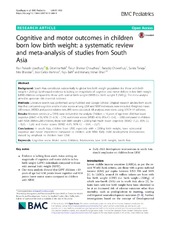| dc.contributor.author | Upadhyay, Ravi Prakash | en_US |
| dc.contributor.author | Naik, Gitismita | en_US |
| dc.contributor.author | Choudhary, Tarun Shankar | en_US |
| dc.contributor.author | Chowdhury, Ranadip | en_US |
| dc.contributor.author | Taneja, Sunita | en_US |
| dc.contributor.author | Bhandari, Nita | en_US |
| dc.contributor.author | Martines, Jose Carlos | en_US |
| dc.contributor.author | Bahl, Rajiv | en_US |
| dc.contributor.author | Bhan, Maharaj Kishan | en_US |
| dc.date.accessioned | 2020-08-14T15:03:34Z | |
| dc.date.available | 2020-08-14T15:03:34Z | |
| dc.date.issued | 2019-01-29 | |
| dc.Published | Upadhyay RP, Naik, Choudhary TS, Chowdhury R, Taneja S, Bhandari N, Martines JC, Bahl R, Bhan MK. Cognitive and motor outcomes in children born low birth weight: A systematic review and meta-analysis of studies from South Asia. BMC Pediatrics. 2019;19:35 | eng |
| dc.identifier.issn | 1471-2431 | |
| dc.identifier.uri | https://hdl.handle.net/1956/23799 | |
| dc.description.abstract | Background South Asia contributes substantially to global low birth weight population (i.e. those with birth weight < 2500 g). Synthesized evidence is lacking on magnitude of cognitive and motor deficits in low birth weight (LBW) children compared to those with normal birth weight (NBW) (i.e. birth weight ≥ 2500 g). The meta-analysis aimed to generate this essential evidence. Methods Literature search was performed using PubMed and Google Scholar. Original research articles from south Asia that compared cognitive and/or motor scores among LBW and NBW individuals were included. Weighted mean differences (WMD) and pooled relative risks (RR) were calculated. All analyses were done using STATA 14 software. Results Nineteen articles (n = 5999) were included in the analysis. Children < 10 years of age born LBW had lower cognitive (WMD -4.56; 95% CI: -6.38, − 2.74) and motor scores (WMD -4.16; 95% CI: -5.42, − 2.89) compared to children with NBW. Within LBW children, those with birth weight < 2000 g had much lower cognitive (WMD -7.23, 95% CI; − 9.20, − 5.26) and motor scores (WMD -6.45, 95% CI; − 9.64, − 3.27). Conclusions In south Asia, children born LBW, especially with < 2000 g birth weight, have substantial cognitive and motor impairment compared to children with NBW. Early child development interventions should lay emphasis to children born LBW. | en_US |
| dc.language.iso | eng | eng |
| dc.publisher | BMC | eng |
| dc.rights | Attribution CC BY | eng |
| dc.rights.uri | http://creativecommons.org/licenses/by/4.0/ | eng |
| dc.subject | Cognitive score | eng |
| dc.subject | Motor score | eng |
| dc.subject | Children | eng |
| dc.subject | Adolescents | eng |
| dc.subject | Low birth weight | eng |
| dc.subject | South Asia | eng |
| dc.title | Cognitive and motor outcomes in children born low birth weight: A systematic review and meta-analysis of studies from South Asia | en_US |
| dc.type | Peer reviewed | |
| dc.type | Journal article | |
| dc.date.updated | 2020-02-10T10:21:30Z | |
| dc.description.version | publishedVersion | en_US |
| dc.rights.holder | Copyright 2019 The Author(s) | |
| dc.identifier.doi | https://doi.org/10.1186/s12887-019-1408-8 | |
| dc.identifier.cristin | 1766406 | |
| dc.source.journal | BMC Pediatrics | |

